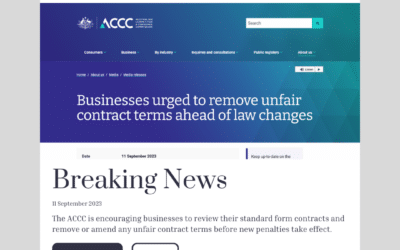
Would you like to know what happens in a Commercial Court case, or a business dispute?
Commercial litigation can be adversarial, litigious and generally does not foster relationships. Due to the nature of proceedings, commencing litigation may not be appropriate if you wish to maintain a personal or working relationship with a party.[i] Specific strategies can be employed to seek your claim and ensure that relationships are maintained with other parties.
How Does A Commercial Court Case Commence?
Generally, commercial litigation involves a dispute between two or more parties where remedies are sought other than criminal convictions.[ii] A commercial court case, for example, a case involving a dispute in negligence and commercial disputes start by a statement of claim being filed with the Court. The defendant(s) then have the opportunity of filing a defence within the time period required by the relevant Court’s Rules.
Commercial litigation generally seeks remedies such as monetary damages, the performance of contracts, the variation of contracts or termination of contracts. In other cases, for example, involving breaches of privacy and even in some defamation cases, remedied and compensation can become more complex in terms of the actual calculation of damages.
What Happens If A Defence Is Not Filed
Default or Summary judgement can be sought if a defence is not filed in time within the specified number of days required by the Court Rules. In addition, a defendant might consider filing a counterclaim either because there is a suffering of a legitimate loss or otherwise as a strategic measure to a statement of claim which has been filed by the plaintiff in a legal dispute.
A defendant can be placed in the “box seat”, at least strategically, where a plaintiff has not filed a defence to these counterclaims. It is because, in these circumstances, the defendant might be able to seek summary judgement thereby seeking almost automatic victory in the case against the plaintiff based on certain criteria set out in the relevant Court’s rules.
Commercial litigation or commercial disputes is a broad field. It encompasses numerous areas including contract law, property law, business law, commercial law, debt recovery, employment law, planning, building and tenancy disputes, wills and estate and personal injury.[iii] While commercial litigation can prove an effective and necessary tool in resolving your dispute and providing a remedy, there are several important factors that you must consider before engaging in commercial litigation.
Have you Tried To Resolve Your Commercial Legal Dispute?
It is essential to consider what steps you have taken to resolve your dispute, whether they have been genuine and what other tools are available to you. Most disputes are resolved outside of the courts through alternative, non-litigious forms of dispute resolution and internally with organisations.
Have you attempted to escalate your dispute through their internal channels? You can escalate your claim to senior members of an organisation including management, executives or board. By escalating a matter internally, your dispute can reach the correct person who has the discretion to negotiate and settle. You can also avoid incurring legal costs.
Seeking To Settle A Commercial Legal Dispute
It is often a well-advised client that will seek to settle a legal dispute, rather than going to Court.
This is because a court case can be costly, stressful and time-consuming. If you are a business owner in a legal dispute, it might be a more sensible outcome to try to settle and negotiate an outcome in your business dispute as opposed to going through the commercial litigation process.
One form of settling a commercial or business dispute is through negotiation. If possible, a case should be negotiated before going to the Court or filing pleadings in the context of commercial litigation.
“When negotiating in a commercial dispute, you should keep correspondence in writing, keep records of the events and request any offers or settlements in writing, as you will benefit from this if the dispute is legally escalated.”
What Can You Do About Costs In A Court Case?
There are cost disclosure obligations on solicitors representing you in your court case, including where your commercial litigation or business court case might get quite expensive.
The total and support cost estimate needs to be given to you, and revised cost disclosure needs to be provided by your solicitor. The fees charged by your solicitor must also be considered to be fair and reasonable for the satisfaction of lawyers’ legal obligations to be satisfied.
Commercial and business court cases in litigation can prove a costly exercise. Litigation is an adversarial process and involves a substantial amount of legal work, correspondence and negotiation, which can add up rapidly. However, a well-advised client will know how to keep these communications and effective. Sometimes it means that a lengthy 10+ page letter might not be appropriate when a single-page letter will do the work necessary.
Due to the high cost of litigation, it is advisable to genuinely pursue other means of resolving your dispute and use litigation as a last resort. Contact AMK Law today to discuss legal costs and work towards a tailored resolution.
Mediations To Settle A Commercial Court Case
Mediation can be used either before a Commercial Court case begins, or even during a case.
Relationships are a vital factor when considering commercial litigation. Commercial and commercial disputes are often emotional and impact those involved substantially. In some circumstances, commencing legal action can be a reactive response to emotions.
It would be best if you consider your motives for commencing litigation. As discussed above, commercial and commercial disputes can be emotional and are important to those involved. You must ensure that you have made genuine attempts to resolve the dispute, litigation is a last resort, and your dispute is genuine and not vexatious.
Where there are good relations, it is easier to settle a commercial court case through mediation.
AMK Law focusses on the best Litigation and effective Dispute Resolution to achieve results for clients, which matter most of all. You can contact us for your tailored legal advice and assistance in drafting an agreement that suits your business needs and contract requirements.
Important disclaimer: The material contained in this publication is of a general nature only and it is not, nor is intended to be legal advice. This publication is based on the law as it was prior to the date of your reading of it. If you wish to take any action based on the content of this publication, we recommend that you seek professional legal advice.
[i] Et al.
[ii] Civil Litigation. Harvard Law School http://hls.harvard.edu/dept/opia/what-is-public-interest-law/public-interest-work-types/civil-litigation/ [Accessed 10 November 2016]
[iii] Accredited Specialists. Law Institute of Victoria <https://www.liv.asn.au/specialists> [Accessed 10 November 2016]

Book Your Appointment
Related Articles
Privilege Under Pressure: Insights from the Optus Case
A Shifting Legal Landscape Today's businesses are under constant threat from cyber attacks, making it increasingly important to understand how they can legally protect their private conversations. Legal professional privilege is a fundamental rule that keeps the...
Ticketek’s $500K Fine: A Legal Perspective on Email Compliance
In the constantly changing world of digital communication, email marketing remains a vital way for businesses to connect with their audience. However, it's crucial to manage this tool with care and attention to legal obligations. The Australian Communications and...
Navigating the Waters of Unfair Contract Terms in Australia
As a small business owner in Australia, you might have come across the recent updates to the Australian Consumer Law regarding unfair contract terms. If it seems a bit complex, don't worry! We're here to simplify it for you in clear terms. Unfair Contract...




